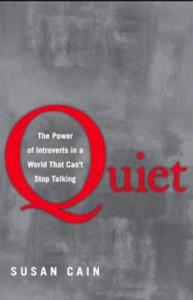
Susan Cain. Quiet: The Power of Introverts in a World That Can’t Stop Talking
Editor
 Susan Cain. Quiet: The Power of Introverts in a World That Can’t Stop Talking. New York: Crown Publishing, 2012.
Susan Cain. Quiet: The Power of Introverts in a World That Can’t Stop Talking. New York: Crown Publishing, 2012.
Okay, I’m an introvert. Or am I? Am I centered in a Green or an Individualist level of development. Am I an Enneagram 7? So many categories. So many boxes. So many ways of practicing a reductionist approach to self, others and the world. Yet, we don’t need to fall into the reductionist trap. Rather than talking about introverts, why not talk about people for whom introversion is an important personality trait or practice?
Despite such question I was looking forward to this book and I realize the reason why is that I identify with introversion so very strongly. When I read the MBTI II (Myers Briggs Typology Inventory II) feedback about myself, so much of it rings true. Yet all through my professional life I have coached and encouraged people to take a more nuanced approach. Not only is it important to see how introversion resonates with your experience and self-concept, but it is also important to see how extraversion shows up.
This book is full of information about the introversion extroversion dimensions of Jung’s and later treatments of the temperaments. I understand it took seven years (not sure of the exact number) for the author to assemble and write the material. Probably the most interesting aspect of this presentation is the dismantling of the claims to primacy of extroversion. This is particularly true in the case of leadership. I really enjoyed this quote from Peter Drucker:
Among the most effective leaders I have encountered and worked with in half a century… some locked themselves into their office and others were ultra-gregarious. Some were quick and impulsive, while others studied the situation and took forever to come to a decision The one and only personality trait the effective ones I have encountered did have in common was something they did not have: they had little or no ‘charisma’ and little use either for the term or what it signifies.
This book is well worth the read, even if you are experiencing a stronger pull toward extroversion.
